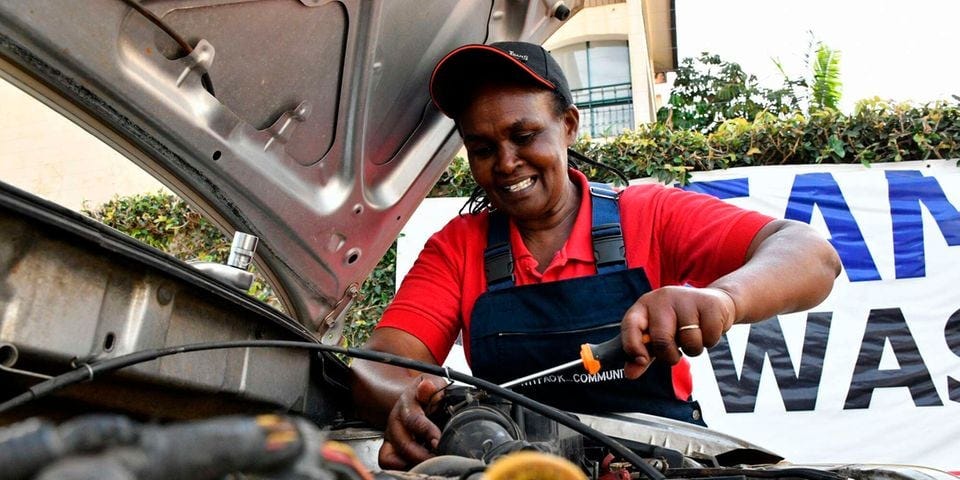Where Identical Informal Businesses Set Up Side-By-Side Are Headed — A Glimpse Of The Future of…
Where Identical Informal Businesses Set Up Side-By-Side Are Headed — A Glimpse Of The Future of African Retail

“Our vision extends far beyond mere transactions; it’s about building sustainable ecosystems where businesses thrive and communities prosper.”
In a recent article on the Nation titled “Why do identical informal businesses set up side by side?” exploring the dynamics of African informal economies, Tim Weiss shed light on the symbiotic relationships that thrive within business clusters in Kenya, affectionately referred to in the article as informal welfare systems. Unlike the traditional models of consolidation and cutthroat competition seen in Western nations as well as the giant-multinationals many of my entrepreneuring colleagues seem to be trying to mirror, these ecosystems thrive on collaboration and interdependence. This insight, drawing from my prior experiences in retail deeply resonated with me and played a significant role in inspiring the founding of WymBee. Recognizing the inherent strength of community infrastructure, we embarked on a mission to foster sustainable growth for MSMEs across Africa by providing & scaling deadstock re-allocation & liquidation services.
As a startup dedicated to revolutionising supply chain dynamics through deadstock re-allocation, we are acutely aware of the challenges faced by African businesses. Deadstock, as we define it, refers to inventory that a business has been unable to sell, despite the products not being obsolete or of poor quality. They are simply classified as deadstock because of competition saturation in the marketplace, leading to a situation where a business has a low sell-through-rate in its market. This concept aligns with Weiss’s exploration of the informal welfare systems within business clusters, where surplus inventory can act as a barrier to prosperity. In many cases, the products categorised as deadstock by one business may hold significant value for another business, particularly in different regions within the country or within the larger African ecosystem. By facilitating the exchange of deadstock through the WymBee Platform, WymBee empowers businesses to unlock the value trapped in their inventory. We help them not only regain liquidity for their goods but also reclaim valuable shelf space, avoid accruing interest on loans due to slow-selling stock, tap into new markets, and improve their sell-through rates. This means businesses can avoid losses caused by deadstock sitting on their shelves or being sold at auction for much lower prices than their initial purchase cost.
Weiss’s research underscores the importance of informal welfare systems within business clusters, emphasising the role of collective action in ensuring the survival and prosperity of individual enterprises. In this we’re completely aligned. Unlike almost every single retail-oriented tech startup in the region, we’re not building a distribution network through which to sell inventory. On the contrary, the entire purpose of WymBee is to ensure high sell-through-rates for our customers. This is why WymBee is focussed on collaboration, more than anything else. We’re dedicated to fostering business communities and creating the infrastructure to facilitate efficient, transparent, and trustworthy collaborations. While deadstock re-allocation and liquidation are unique to our service, they are not and will never be our end-game. As a committed localist, my leadership of WymBee is geared towards contributing to the resilience of local economies across Africa, eliminating waste, guaranteeing inventory liquidity, unlocking new opportunities for growth and expansion for our clients, and much more. Our vision extends far beyond mere transactions; it’s about building sustainable ecosystems where businesses thrive and communities prosper.

In addressing the challenges outlined by Weiss, WymBee offers a targeted solution that aligns with the needs & reality of African businesses and eco-systems. What our detractors (those few that assume retail-oriented innovations have been rejected by the market) fail to appreciate is just how well our company is aligned to the structures and realities of our markets. Our approach not only supports individual enterprises but also strengthens the fabric of community resilience that underpins informal economies. We’re not just talking, our optimism is backed by support from the Kenyan government through the Kenya National Innovation Agency (KENIA), positioning WymBee for collaborations with some of the best institutions in the country to make sure African businesses have everything they need to succeed. This in fact, is why we were recognized as one of the recipients of the Kenya Presidential Innovation Award. By embracing innovation and collaboration, we’re paving the way for inclusive growth that transcends traditional models of development.
This is a preview of the full article. Continue reading on Medium for the complete content.
Continue Reading on Medium